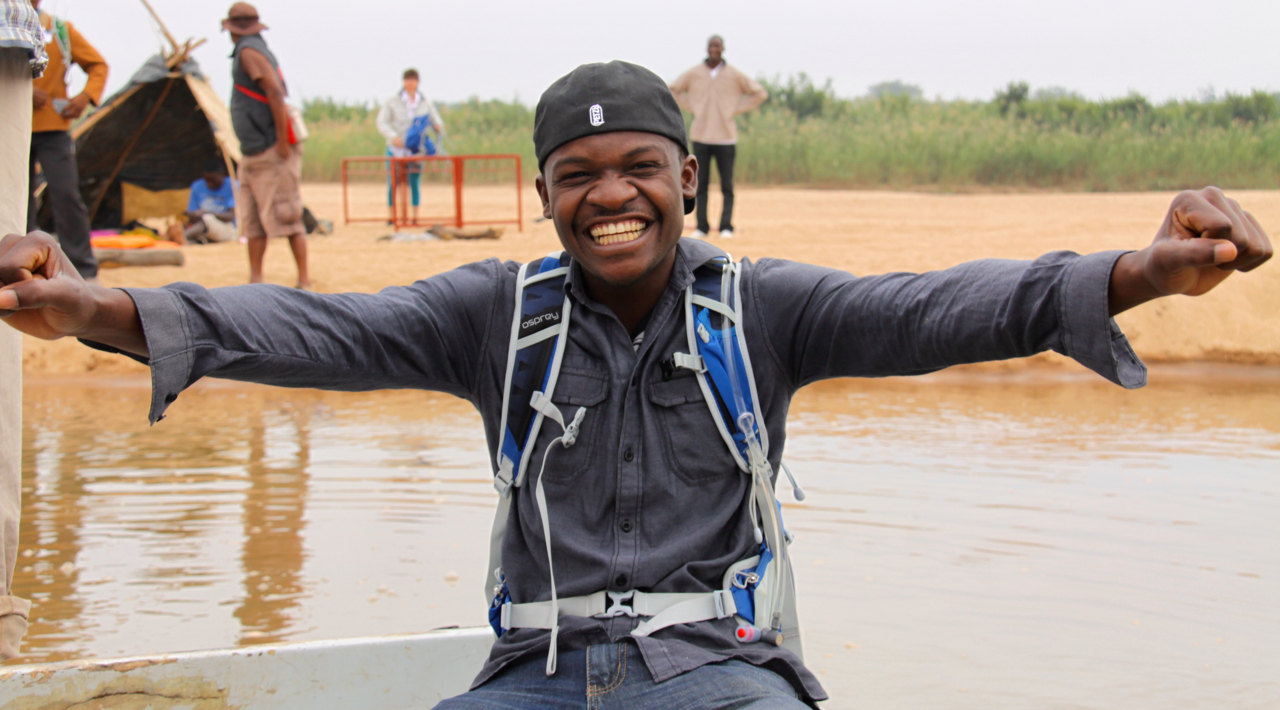FOR IMMEDIATE RELEASE— Maputo, Mozambique, Tuesday, July 28, 2015
For the past twelve days, 33 African and North American students, adventurers, scientists and conservation leaders gathered in Gorongosa National Park for the first ever Lost Mountain Next Gen Symposium.
“The 2015 Lost Mountain Next Gen Symposium was created to empower young people from around the world to look at conservation from a new perspective,” Lost Mountain Director, Majka Burhardt explains. “We created an environment where we challenged participants to consider the symbiosis and strength derived from a collaborative approach to conserving ecosystems.”
The twelve-day symposium sought to launch a wave of “disruptive” conservation – a model for building community-driven conservation in some of the world’s most remote and biologically diverse places. In particular, the Symposium students created the next phase of community engagement, development, and conservation for Mount Namuli, a 7,936-foot granite monolith and the largest of a group of isolated peaks that tower over the ancient valleys of northern Mozambique.
“The Lost Mountain is a full-blown conservation project that seeks to promote the preservation of Namuli’s unique biodiversity as well as the precious ecosystem services it provides to local communities,” explains Symposium Faculty, Elizabeth O’Neill. “With their new working knowledge of the Open Standards for the Practice of Conservation, Leave No Trace training, as well as leadership training, the symposium students have joined the Namuli planning team, applying the framework plus their collective energy, knowledge, and innovation to the tremendous challenge of conservation in this isolated area.”
Mount Namuli is one of the world’s least explored and most threatened habitats. Here, plants and animals have evolved as if on dispersed oceanic islands, so that individual mountains have become refuges to their own unique species, many of which are yet to be discovered or described by science.
“For my team and I, the symposium was a very valuable experience,” explains Geraldo Palalane, Project Officer at LUPA – The Lost Mountain’s Mozambique-based conservation partner. “The Open Standards were particularly interesting and useful. By looking at targets, threats, and strategies we learned a lot about how to truly achieve change. We have a common understanding of how to approach significant projects like Mount Namuli, how to set ourselves up for success in the future, and we have an expanded network of experts and students that truly spans the globe.”
“As we look at the next twenty years on Mount Namuli, connecting our partners like LUPA with students, scientists, rangers and conservation experts from around the world is a key part of future success,” explains Burhardt. “To create a realistic plan for integrated conservation, community engagement and development on Mount Namuli, it’s imperative to bring future leaders into the discussion around conservation and allow them to be part of the action. The diversity of the cohort at the symposium is what made it so successful.”
“It gave me a lot of inspiration to have so many young students there,” Palalane adds. “Young people dream – they take ideas to the next level. Sometimes as professionals, we limit ourselves and do what we have always done. But the students brought with them new, dynamic ideas.”
Drawing on everyone from high school students to PhD candidates, the 2015 Lost Mountain Next Gen Symposium brought a unique combination of theoretical and practical skills and experiences to the Mozambican conservation arena.
“The Symposium gave me more tools, skills and experiential knowledge to use in my career,” explains Vasco Lino, an undergraduate student majoring in Biological Sciences at Universidade Lúrio in Pemba, Mozambique. “It was a very unique experience that I expect will be very valuable to me as I move into the future.”
As students and faculty head back to their respective corners of the globe, the experience and fresh insight is carried with them – to be shared with colleagues and peers back at home.
“To really bring significant change, I know that the tools and skills I learned at the symposium must be shared with my colleagues,” Palalane reflects. “I look forward to a day in the future when this group reconnects and we share all of the ways we have implemented what we have learned both on Mount Namuli and around the world.”
www.legadoinitiative.org
Interviews, Imagery, and More Information:
Leigh Boyle, Community Leader, Lost Mountain
+1-604-910-4903 | team@additiveadventure.com
ABOUT THE LOST MOUNTAIN
The Lost Mountain Initiative is an international venture to foster a future where people and ecosystems thrive together on Mount Namuli, Mozambique. The Initiative began with a 2014 field expedition combining rock-climbing, cliffside scientific research, integrated conservation planning, and media. Mount Namuli, a 7,936-foot granite monolith, is the largest of a group of isolated peaks that tower over the ancient valleys of northern Mozambique. It is one of the world’s least explored and most threatened habitats. Here, plants and animals have evolved as if on dispersed oceanic islands, so that individual mountains have become refuge to their own unique species of life, many of which have yet to be discovered or described by science. Biologists and conservationists from around the world have identified Mount Namuli as a global hotspot: a place of critical biodiversity and an opportunity to model a new vision for wildlife preservation that integrates the wishes and needs of local people.
The Lost Mountain Consortium is directed by US-based Additive Adventure and Mozambique-based LUPA. The Lost Mountain is supported in part from a grant from the Critical Ecosystem Partnership Fund—a joint initiative of l’Agence Française de Développement, Conservation International, the European Union, the Global Environment Facility, the Government of Japan, the MacArthur Foundation and the World Bank. The Lost Mountain Next Gen Initiative’s presenting partner is Positive Tracks, a national, youth-centric nonprofit that helps Generation Next get active and give back using the power of sport and adventure. With key support from Ethiopian Airlines, Osprey Packs and Goal Zero and supporting sponsors Clif Bar, Patagonia, Kickstarter, Petzl, Scarpa, Julbo and 1% for the Planet.
—
legadoinitiative.org | www.legadoinitiative.org/next-gen-2015-symposium/ | facebook.com/lostmountainorg | www.facebook.com/majkaburhardtofficial
#LostMountain | @majkaburhardt

